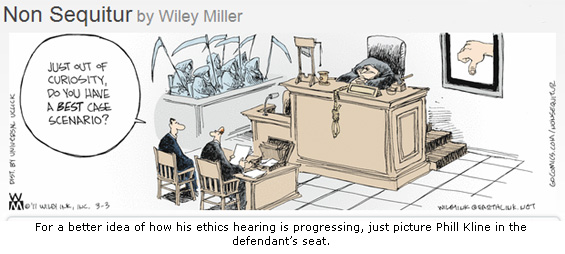By Cheryl Sullenger
Topeka, KS – After eight days of testimony, the first part of an ethics hearing against former Kansas prosecutor Phill Kline has concluded. Kline is being charged with two counts of ethics violations for his handling of abortion clinic investigations. Only count one has so far been heard. The hearing will resume on July 19, where the second count of the complaint will be addressed.
The hearings themselves were conducted under conditions that can only be described as punishing. In some cases the court days began at 8:00 AM and concluded after 6:00 PM. Yesterday, the lunch break was only 30 minutes, and participants and observers were forced to either quickly gobble down their food in the lobby or go without. Breaks were few and far between. Once the court room was closed, there was no entering or exiting except in the case of emergency.
“It is reprehensible that a man that simply tried to do is duty and enforce the law is being treated this shamefully,” said Operation Rescue President Troy Newman.
Over the eight days, Kline spent nearly 23 exhausting hours on the stand giving testimony, dispelling false assumptions, and revealing a concerted political effort to obstruct his investigations into claims of unreported child sex abuse and illegal late-term abortions.
The complaint against Kline was originally filed by attorney Dan Monnat, who was at the time representing George Tiller, a late-term abortionist who was charged by Kline with 30 criminal counts of illegal abortion before that case was dismissed on unfounded jurisdictional grounds as part of a politically motivated effort to obstruct justice. Tiller was later charged and tried on a weaker case and was acquitted.
The case is being tried by Disciplinary Administrator Stan Hazlett, an appointee of the Kansas Supreme Court whose bias against Kline appeared in court to take on personal overtones. The Kansas Supreme Court is comprised of mostly appointees of former Gov. Kathleen Sebelius, a radical supporter and protector of abortion, who during her tenure, packed state agencies and regulatory boards with those who would not only look the other way concerning abortion abuses, but would actively cover up crimes and obstruct investigations.
Of the three Disciplinary Board members serving as judges over the case, two gave campaign contributions to Kline’s political opponents during what court witnesses described as contentious political races that focused on the abortion issue and were filled with personal animosity.
To compound the situation, Kline is represented by two attorneys appointed for him by former Attorney General Steve Six, also a fierce political enemy of Kline’s who took overt steps to impede his abortion investigations.
One of those attorneys is Mark Stafford, former chief counsel for the Kansas State Board of Healing Arts who was forced to resign in disgrace after legislative dissatisfaction and scandals involving Board ineptitude and cover-ups. Stafford was involved in the politically motivated cover-up in the KSBHA investigation into the death of Christin Gilbert during a botched third trimester abortion at Tiller’s Wichita abortion clinic in 2005.
“It seems that his most ardent political enemies have stacked the case against him in every way possible. Prosecutors, judges, and one of his own attorneys have politically opposed Kline at some point,” said this writer, who attended some of the hearings. “Hazlett is acting more like the pro-abortion Kansas Supreme Court’s flying monkey than a professional. He has even disregarded his own investigators’ findings that Kline did not act unethically. I also am very concerned about the representation Kline is receiving and certainly have no trust that these proceeding have any interest in justice.”
Kline spent most of his time on the stand yesterday in his own defense attempting to clear up numerous erroneous assumptions found in the Kansas Supreme Court’s published findings in three related cases. Two of the cases involved once-secret lawsuits filed by abortion clinics against Kline to halt the criminal investigations against them and bury all the evidence of their criminal conduct. The third case involved an appeal by Planned Parenthood to oppose subpoenas issued by Kline during his investigations.
Based on evidence gathered by Kline as Attorney General and as Johnson County District Attorney, 107 criminal counts have been filed against Planned Parenthood for illegal late-term abortions then manufacturing documents to cover it up. That case is still pending. Attorneys for Planned Parenthood have viciously attacked Kline through the sympathetic Kansas Supreme Court and in the court of public opinion to halt Kline’s investigation and derail Planned Parenthood’s prosecution.
Kline indicated that the Kansas Supreme Court obstructed his abortion investigations and took actions that completely derailed his ability to ensure that girls under 15 who had abortions in Kansas were not in danger of continued sexual exploitation.
There were hundreds of cases where underage girls received abortions in Kansas, but were never reported to the correct authorities as suspected abuse. The obstruction of the Supreme Court and other agencies prevented law enforcement from being able to locate these girls to make sure they were safe.
During a lunchtime interview, Kline accused the Kansas Supreme Court of obstructing justice and indicated that Justices Carol Beier and Lawton Nuss had conflicts of interest and should have recused themselves from participating in the abortion cases.
There were additional revelations during the testimony:
• Even though Kline was sued in his official capacity, then Attorney General Morrison denied him legal representation. Kline was forced to personally fund legal bills to the tune of $200,000 defending against the suits filed by the abortion clinics. That was necessary to keep the evidence against Planned Parenthood from being turned over to the abortion business and destroyed.
• Kline told the panel that he was ordered to surrender all of his sensitive investigative materials to former Attorney General Paul Morrison which were then improperly given to attorneys for the abortion clinics, compromising the integrity of the investigation.
• Animosity that Morrison held for Kline was so intense that he “poisoned” the Johnson County District Attorney’s staff against Kline to the point where three attorneys who tried co-operate with the transitional period prior to Kline taking office were branded as traitors.
• Even though it repeatedly ruled in his favor and declined to sanction him, the Kansas Supreme Court continually threatened Kline. Justice Beier wrote repeatedly that sanctions could come against him at some later date. “Perhaps this is that day,” Kline said.
The copying, transport, and storage of Kline’s investigative files that included working copies of redacted abortion records were also the subject of much discussion. Kline has been accused of mishandling the records and jeopardizing the privacy of patients. However, expert witness Tom Stanley, Deputy District Attorney of Reno County testified that in his opinion, the records were handled properly under the circumstances.
Stanley described the animosity that pervaded Morrison’s office during the transitional time that Morrison and Kline engaged in an unusual “job swap.” As Johnson County District Attorney, Morrison had defeated Kline for Attorney General in a contentious political campaign with the help of an estimated $1 million dollars from Tiller and other abortion groups. Kline was then appointed by the Republic Party to serve out Morrison’s term as Johnson County District Attorney.
Kline had wanted to transfer investigative files to the Johnson County DA’s office where he planned to pursue criminal charges against Planned Parenthood. However, Morrison had denied Kline’s request for a secure office space during the transition period. The evidence room was not considered a secure location because two keys existed, and one of which was readily accessible by any number of hostile staff members. Morrison was later forced to resign as Attorney General in disgrace after it was learned that he attempted to use his illicit lover still employed by the Johnson County District Attorney’s office to help him impede Kline’s abortion investigations.
Kline testified that when the copies of the files that ended up in Johnson County were made at Kinkos, his investigator Tom Williams secured a copy machine away from the others and copied the records in a way that so no one else had access. The copies never left the custody of William’s protection. After that they were placed in a plastic bin and stored at the apartment of former investigator Jerad Reed.
Deputy DA Stanley testified that because Reed was the only person who accessed that apartment during the time the files were stored there, it was by far a more secure location that the Johnson County evidence locker.
Stanley also discussed in detail the duty of law enforcement to protect the integrity of their investigations. Kline is accused of using deception to obtain information from the Kansas Department of Social and Rehabilitation Services (SRS) since Tom Williams did not disclose the full scope of the investigation to them.
However, Stanley testified that the full scope of an investigation is never revealed to anyone, not governmental agencies, phone companies, banks, or any other group from which records are required in the course of an investigation. To tell such entities details of such an investigation would compromise the investigation. Stanley indicated that deception may be necessary and completely ethical and acceptable under the law in order to protect the integrity of the investigation.
Hazlett, on cross examination, parsed words with Stanley and indicated to him that not telling the full truth was a lie. In response, Stanley replied, “As long as I have been a prosecutor, law enforcement has been allowed to lie.”
Kline was allowed only one day to present his defense after the prosecution took seven days to present its case. Some witnesses, including Deputy DA Stanley, were bound by pre-hearing orders that prevented them from fully testifying about their expert opinion of the facts. Kline’s attorney Reid Holbrook went on the record saying that the ruling by the Disciplinary Panel impeded his client’s ability to properly defend himself.
Kline will return to Virginia where he is employed as an assistant law professor at Liberty University. The ethics case will resume in Kansas on July 19.






